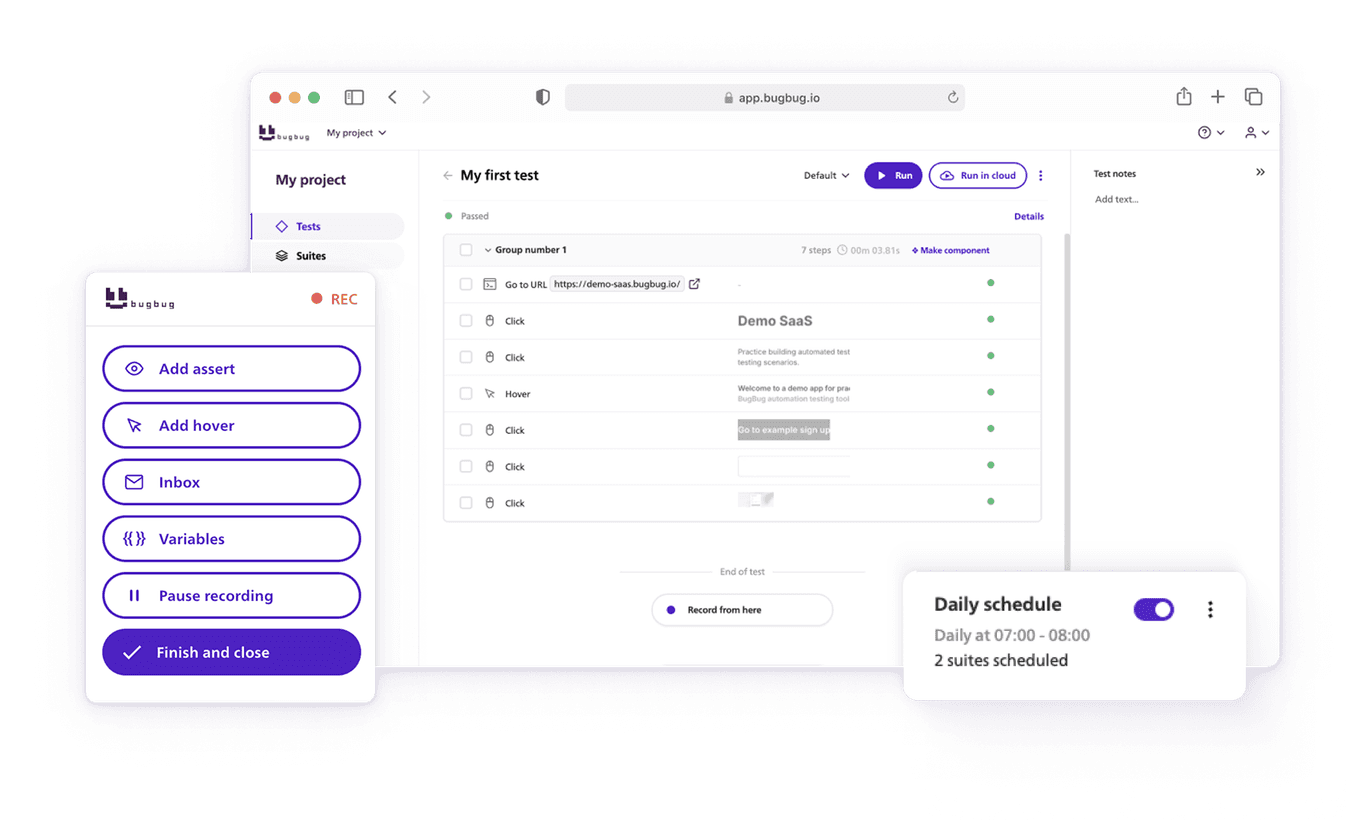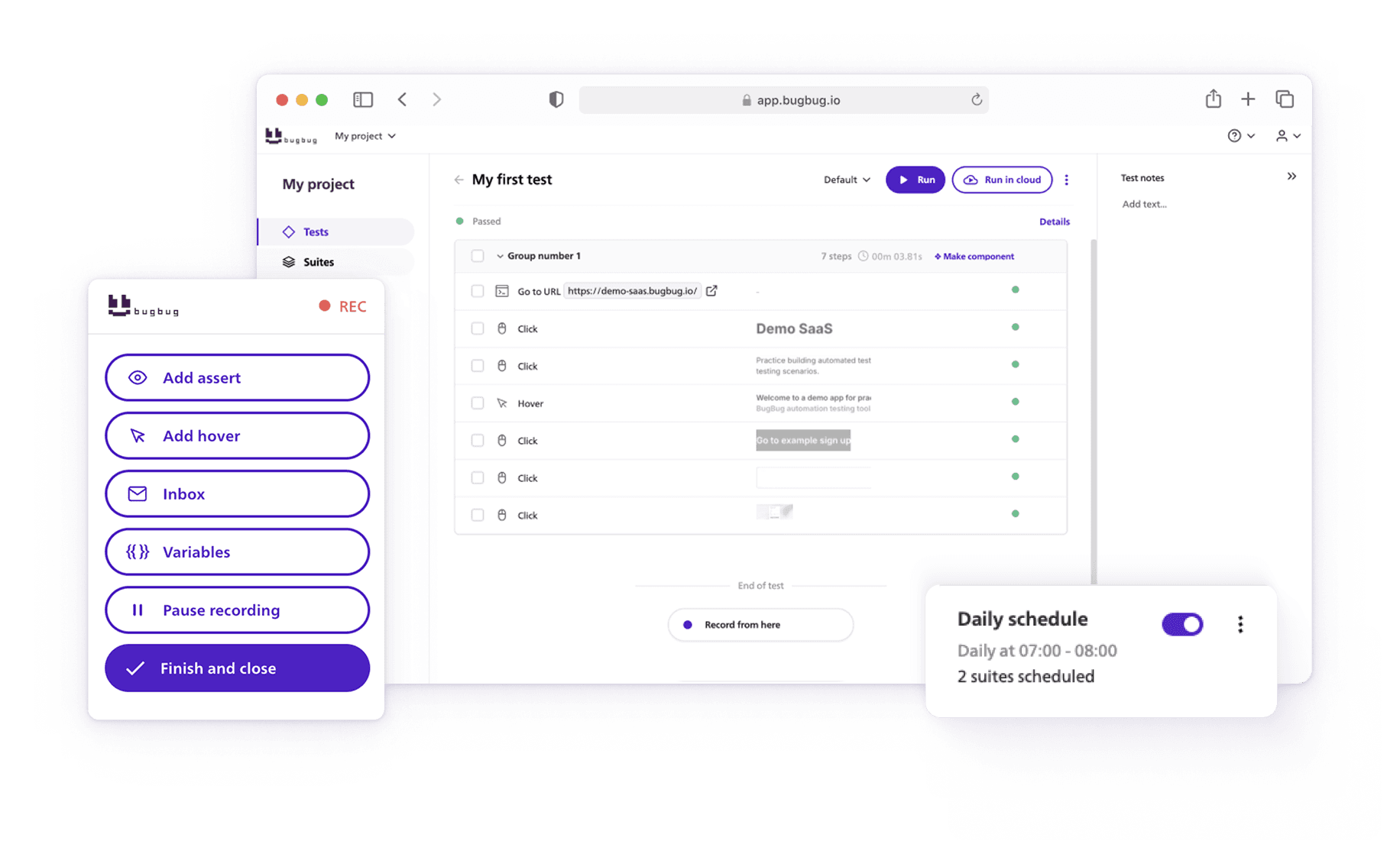In software development, ensuring the quality of an application is essential, and testing plays a critical role in this process. When you write a test, there are several approaches to consider, each with different levels of detail and automation. Whether you choose to manually execute tests or write a test script to automate them, understanding the key differences between test cases, test scripts, and test scenarios is important for effective testing.
TL;DR
- Test cases provide detailed, step-by-step instructions to manually or automatically validate specific features of the application under test, ensuring functionality is properly tested.
- Test scripts automate test case execution using line-by-line code, improving efficiency and accuracy across multiple test environments, often saving time in repetitive tasks.
- Test scenarios focus on high-level user journeys within the system under test, allowing testers to identify broader functionalities without detailed steps.
- The primary difference between a test case and a test script lies in execution: test cases guide manual testing, while test scripts automate the process for consistency.
- Using automation tools and frameworks to create and run test scripts ensures higher scalability, faster feedback, and greater test coverage in software testing projects.
Check also:
- Top 15 Codeless Automation Testing Tools for QA
- Testing Tools for Web Application - The Ultimate Guide
- DevOps Testing Tools
A test script is a set of detailed instructions that automate the testing process, making it faster and more consistent. When you create test cases and create test scripts, you're building the foundation for testing the software’s functionality. Scripts are the most reliable when it comes to repetitive tasks, ensuring that you can run the same tests across multiple environments without human error. By creating test scripts, you can increase efficiency and accuracy in the testing phase, leading to a smoother release process.
What is a Test Case?
A test case is a specific condition used to test a feature or functionality of the application under test (AUT). It typically includes detailed test steps, input data, and expected outcomes. Test cases give testers a clear guide on how to perform a test and validate that the system behaves as expected. A test case document can be executed manually or as part of an automated test script.
Automate your tests for free
Test easier than ever with BugBug test recorder. Faster than coding. Free forever.
Get started
Key Components of a Test Case:
- Test ID: A unique identifier.
- Test Description: A summary of what to test.
- Preconditions: Setup required before testing.
- Test Steps: Line-by-line instructions to follow.
- Expected Results: The expected behavior of the system.
- Test Data: The inputs used during testing.
- Actual Results: The outcome after executing the test.
In a manual testing scenario, testers write and follow these steps to test a specific function. If the test conditions are met and the results align with expectations, the test passed; otherwise, it fails, requiring further investigation.
What is a Test Script?
A test script in software testing refers to a line-by-line description or code that automates the execution of test cases. Testers can create automated test scripts to replace manual execution, saving time and ensuring consistency. Test scripts are programs that execute specific actions, validating the functionality of the software automatically. For example, a test script in Java might check whether a user login function works correctly, using predefined test data and expected results.
Automate your tests for free
Test easier than ever with BugBug test recorder. Faster than coding. Free forever.
Get started
Key Components of a Test Script:
- Script Code: The actual code used to interact with the system.
- Test Data: Input values to validate different conditions.
- Expected Results: The desired outcome from the test script.
- Step in the test script: Each action performed during the script execution.
When writing test scripts, a test script approach often involves using tools or frameworks to generate scripts automatically or write them in easier languages like Java or Python. The test script should be clear and maintainable, with the ability to handle multiple test environments and be reused across similar features.
Test Script Example
Here's an example of a test script used to automate the login functionality of a web application. Suppose you want to test the login page to verify that users can log in with valid credentials. Using a test automation framework like Selenium, you could write the test script code as follows:
java:
public void loginTest() { // Open the browser driver.get("https://example.com/login"); // Input username driver.findElement(By.id("username")).sendKeys("testUser"); // Input password driver.findElement(By.id("password")).sendKeys("password123"); // Click login button driver.findElement(By.id("loginButton")).click(); // Verify login success String expectedURL = "https://example.com/home"; assertEquals(driver.getCurrentUrl(), expectedURL); }
This test script example is an automated script that verifies the login functionality with a single test case. You can modify the test script to handle different inputs or environments, creating multiple test scripts for various conditions like invalid passwords or username checks.
Automate your tests for free
Test easier than ever with BugBug test recorder. Faster than coding. Free forever.
Get started
When to Use Test Scripts
- Using a test script is ideal when you want to automate repetitive tasks.
- Write test scripts when testing workflows that require accuracy and consistency across different platforms.
- Test scripts run in test automation frameworks, providing faster feedback compared to manual testing.
- Effective test scripts can validate complex systems, ensuring you test each software feature thoroughly.
You can create a test script template as a starting point to write test scripts more efficiently, enabling you to generate a simple script quickly or modify it for different scenarios. By having a clear script template, you can create consistent, reliable tests that are easy to maintain.
Test Script vs Test Case
While test cases and test scripts are closely related, they serve different purposes. A test case documents what needs to be tested, while a test script automates that process. Test scripts save time by eliminating the need for repetitive manual execution and are often used in regression testing or when testers need to write consistent scripts in a reusable format.
A test script might be generated from a test case, but it focuses on automating the test steps to run in various test environments. Testers can use test automation frameworks like Selenium, JUnit, or Cypress to create and run test scripts.
Check also our guide on the best Selenium Alternatives.
For example, if you are automating a login test, you can start by creating a test script using a tool or writing it in Java. The test script is clear in its purpose, such as validating the login functionality across different browsers.
What is a Test Scenario?
A test scenario describes a high-level condition or user journey you want to validate in the application or system under test. Unlike a test case or test script, a test scenario doesn’t go into the detailed steps or inputs but focuses on what part of the software you want to test.
For example, a test scenario for an e-commerce site could be "Test the checkout process." From this scenario, you can generate several test cases or test scripts to validate specific paths within the system. Check our detailed guide on test cases for ecommerce websites.
Test Case vs Test Script: Key Differences
| Feature | Test Case | Test Script |
|---|---|---|
| Definition | Detailed instructions to perform a test | Automated code used to execute tests |
| Manual/Automated | Can be both manual or automated | Typically automated |
| Test Steps | Detailed, manual steps | Line-by-line program execution |
| Used For | Used to test functionality manually or automatically | Used to test an application automatically |
| Creation | Requires a detailed process | Requires coding or a test automation tool |
| Reusability | Can be reused with updates | Easily reusable in multiple environments |
Conclusion
Understanding the differences between test cases, test scripts, and test scenarios is crucial for effective software testing. Test cases provide a structured approach to document what needs to be tested, while test scripts automate the process, providing faster and more reliable results in different test environments. Meanwhile, test scenarios help testers focus on broader user journeys within the system under test.
Automate your tests for free
Test easier than ever with BugBug test recorder. Faster than coding. Free forever.
Get started
By using tools and frameworks to write and run your test scripts, you can ensure higher efficiency, accuracy, and scalability in your testing efforts. Whether you are writing test scripts manually or generating them using automation tools, making sure they are well-structured and maintainable will help you achieve the best results in your software testing projects.
Happy (automated) testing!



